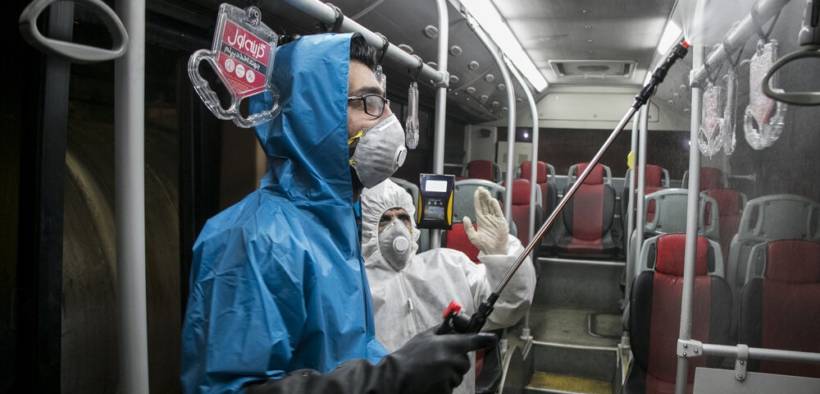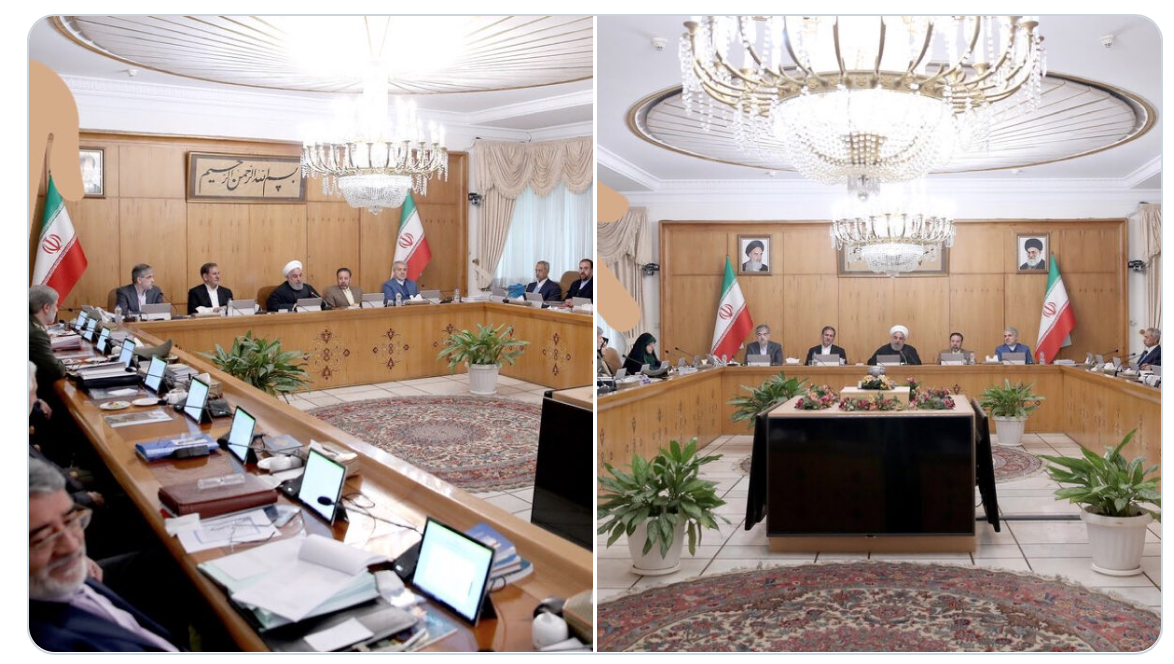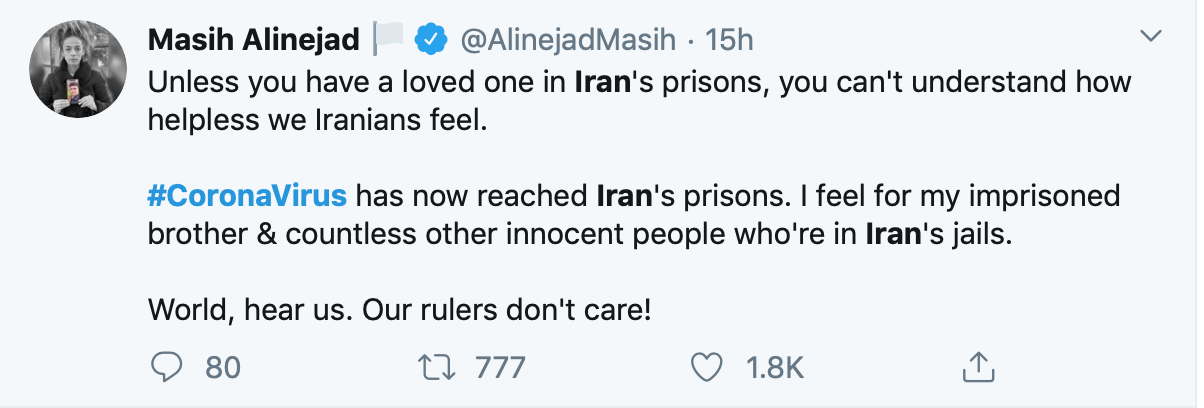Iran Shuts Down Parliament As Coronavirus Epidemic Spreads

“Without any recourse to international help or humanitarian aid it is unclear how Iran will resist the epidemic, nevermind prevent its spread to neighboring countries.”
It all began Tuesday when Iran’s Deputy Health Minister Iraj Harirchi confirmed rumors that he had contracted the coronavirus and was now in quarantine. A day after he was seen at a press conference looking desperately ill, rumors flew that high ranking officials had been compromised – including Ayatollah Ali Khamenei, the Supreme Leader of the Islamic Republic of Iran.
And indeed as of Friday (February 28) Iran admitted that seven of its most senior officials tested positive for the coronavirus, including Vice President Masoumeh Ebtekar, President Hassan Rouhani’s deputy for women’s affairs and the highest-ranking woman in government.
News of her illness came a day after a cabinet meeting in which she was in close contact with other government leaders, including President Rouhani. A photo posted by a BBC Persia reporter on Twitter shows Ebtekar sitting near the president.

Should Ayatollah Khamenei prove, as many sources have argued, to have fallen prey to the virus, the very integrity of the Republic could stand in the balance.
With millions of pilgrims and foreign students flying in and out of Iran every year, the spread of the virus could swiftly overwhelm the country’s health system and lead to serious national security issues.
The holy city of Qom – an hour drive or so from Tehran, the capital, attracts on its own some 22 million pilgrims per year, in addition to an estimated 2.5 million foreign students, mainly from the Middle East and Asia – where the virus has proven to be most virulent.
In truth, Iran is facing an epidemic of terrifying proportions. Without any recourse to international help or humanitarian aid it is unclear how Iran will resist the epidemic, nevermind prevent its spread to neighboring countries.
Unlike China, which mobilized great resources to combat the spread of the virus – all the while enrolling the help of tech companies and medical research facilities to manufacture a vaccine – Iran simply cannot offer any rebuke to the growing epidemic.
Days after Mahmoud Sadeghi, a prominent member of parliament, confirmed on Twitter that he too had fallen ill with the coronavirus, parliament has now closed, putting the country in a dangerous institutional limbo.
Officially Iran’s coronavirus ‘situation’ has not yet reached critical mass – or so state officials have claimed. With 16 deaths since the outbreak and a reported 245 identified cases, Tehran is adamant the word ‘epidemic’ is a long way away … and yet reliable sources within the health ministry have warned that official figures are not a true reflection of reality.
Speaking to Citizen Truth an epidemiologist based in Tehran explained that while Iran is making every effort to contain the spread of the virus, crippling sanctions and fears of popular hysteria have limited the state’s response ability – putting the Islamic Republic at risk of both a mass epidemic and social unrest.
“I can personally confirm that several prisons and universities across the country have been infected and this could lead to a very serious health crisis. Iran simply cannot handle an epidemic, our health system is barely functioning as it is… There is no way of telling what impact the coronavirus will have on the country, let alone the region unless the international community steps in.”
Posts on Twitter and across other social media have also confirmed fears that Iran’s battle with the coronavirus is far more widespread than officials are letting on.
Earlier last week the authorities ordered schools and religious seminaries in Qom to shut down until further notice. Other cities across Iran may follow suit as news of further cases are being confirmed.
Health Minister Saeed Namaki said the virus reached the country through an Iranian merchant from Qom who used to travel to China regularly.
“Flights were suspended between the two countries, but he used indirect flights,” Namaki said on Sunday, urging people not to travel to the holy city.
On Friday health ministry spokesman Kianoush Jahanpour cautioned that “the rate of coronavirus infection would continue to rise in the coming days”.
“Staying home, restricting traffic, reducing movement and interactions, avoiding unnecessary travel, cancelling any nationwide gatherings along with observing individual health tips are the only ways to control Covid-19,” he tweeted.
More troubling for Iran still is the impact an epidemic will have on its institutions and evidently its economy at such a delicate juncture – the Islamic Republic is facing mounting pressure both at home and abroad as criticism for both its system of governance and its foreign policy has widened.
As more Iranians are growing disenchanted with 1979’s revolutionary ideals, news that Ayatollah Ali Khamenei’s health may have been compromised are spreading far and wide.
While the cleric made several appearances in public to comment on last Friday’s parliamentary elections, news of a state cover-up have persisted.
Atoosa Lankarani, a political blogger from Tehran warned that most Iranians have lost all faith in state officials, preferring to turn to social media and Google to keep abreast with news on the coronavirus and how to avoid contamination.
“In the past few days hospitals in the capital have been inundated with people demanding to be screened. There is a very palpable mistrust and anger towards our government. People are suffering… it has been one thing after the other and people cannot cope anymore.”
Ali Daghestani, a junior official based in Qom noted, “Senior government officials and high ranking members of the clergy have been exposed … the seat of government is in a complete lockdown situation. Iran’s security apparatus is taking over and that plays into rumors that Ayatollah Khamenei may have contracted the virus. Needless to say that Iran is facing much uncertainty.”
He added, “Historically Tehran has used the Basij forces to crackdown on political dissent. Now once again those forces have been deployed and it signals the seriousness of the crisis.”
The head of the WHO’s emergencies programme said on Thursday that the apparent high mortality rate in Iran indicated its outbreak might be more widespread than realised.
“The most likely factor is that obviously this disease came unseen and undetected into Iran so the extent of infection may be broader than what we are seeing,” Dr Michael Ryan told reporters.
“There is a very high clinical capacity for managing severely ill patients in Iran, so I don’t suspect this has anything to do with clinical care,” he added.
If Iran’s tone remains defiant in the face of the developing health crisis – Ayatollah Khamenei accused last Friday western capitals of rigging elections by heightening the public’s fear of a deadly epidemic – Tehran is bracing itself for impact.
“An epidemic could throw Iran completely out of balance, and this time I fear the public will not show much patience … there is genuine fear among state officials that the coronavirus will unravel what decades of economic sanctions and political pressure could not,” stressed Mr Daghestani from Qom.
And, “Iran is now the second focal point of the coronavirus outbreak – after China, and Iran’s struggles to contain the epidemic will have far reaching repercussions … not just for the region but the world at large if we keep in mind that any outstanding pockets of contamination could spark a second wave.”
Indeed, the Middle East is in many ways the perfect place to spawn a pandemic, experts have warned, with the constant circulation of both Muslim pilgrims and itinerant workers who might carry the virus.
















